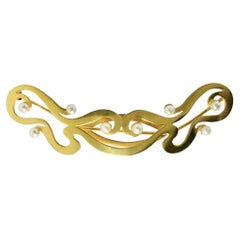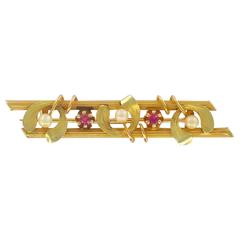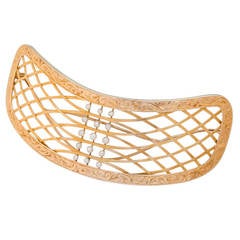Barrette Art Nouveau
Antique Early 1900s American Art Nouveau Brooches
Oriental Pearl, Gold
Recent Sales
Antique Early 1900s French Art Nouveau Brooches
Natural Pearl, Pearl, Gold, Yellow Gold, 18k Gold
Antique Late 19th Century American Art Nouveau More Jewelry
Natural Pearl, 14k Gold
Early 20th Century French Art Nouveau Collectible Jewelry
Glass
Antique Early 1900s Unknown Art Nouveau More Jewelry
18k Gold, Yellow Gold
Antique 1890s American Vanity Items
Pearl, 14k Gold
Antique Early 1900s American Art Nouveau More Jewelry
Sterling Silver
Antique Early 1900s American Art Nouveau More Jewelry
Diamond, Platinum
A Close Look at Art-nouveau Jewelry
Art Nouveau — generally considered to have begun in the late 1800s and ended with the start of World War I — was a movement in the decorative arts that drew inspiration from natural forms, such as trees, flowers and, of course, the human figure. The three main themes present in Art Nouveau jewelry and watches were flora, fauna and women.
Art Nouveau, which reached its pinnacle in the year 1900, spawned from artists who rejected the historicism of their predecessors to create an entirely new visual vocabulary. As compared to Art Deco jewelry’s geometric patterns and sharp lines, the extravagant style of antique Art Nouveau jewelry is characterized by curvilinear forms and whiplash lines, vibrant materials and dramatic imagery.
The first art and design movement of the 20th century, Art Nouveau was also a reaction against the Industrial Revolution, and took its inspiration from the theories of the Symbolists, the art of the Pre-Raphaelites, the ideas of John Ruskin and his follower William Morris and, most importantly Japanese crafts. (The country was a fertile ground for inspiration after it was opened to the West in 1854.) The Art Nouveau style touched all manners of the arts, including the most exultant jewelry.
Nature was a favorite muse for artists going back to the 18th and 19th centuries, but in the hands of 20th-century artists, it was depicted in new ways. For example, a withering flower was considered just as beautiful as one in full bloom. Winged creatures, such as insects and birds, were also a popular subject. Dragonflies and butterflies were particular favorites because they morphed so dramatically in different life stages.
This was also a reference to women, whose role in society was evolving. It was not uncommon to see a piece of jewelry that would at once reference a woman as a winged creature (think René Lalique’s famous Dragonfly brooch, circa 1897–98, at the Gulbenkian Collection in Lisbon). However, just as women’s roles were ambiguous, so was their image, as the femmes nouvelle were simultaneously eroticized and romanticized.
In addition to Lalique, vital figures in Art Nouveau jewelry included Louis Comfort Tiffany in the United States, Vladimir Soloviev, who designed jewelry for Peter Carl Fabergé in Russia, Fuset Grau of Spain, Karl Rothmuller of Germany and Philippe Wolfers of Belgium.
Art Nouveau jewelers used every “canvas” imaginable, looking beyond brooches and necklaces to belt buckles, fans, tiaras, dog collars (a type of choker necklace), pocket watches, corsages and hair combs. Multicolored gems and enamel could complete this vision better than diamonds. Jewelers also favored pearls, particularly baroque pearls, for their large size and irregular shape. However, opal was the most popular stone — its iridescence harmonized perfectly with the enamel, and it could be carved into any shape. Art Nouveau jewelry was primarily set in yellow gold.
Find a range of antique Art Nouveau jewelry today on 1stDibs.
- Where did Art Nouveau originate?1 Answer1stDibs ExpertMay 14, 2024Art Nouveau originated in France and Great Britain, but variants materialized elsewhere. The visual vocabulary of Art Nouveau was particularly influenced by the soft colors and abstract images of nature as portrayed in Japanese art prints, which arrived in large numbers in the West after open trade was forced upon Japan in the 1860s. Impressionist artists were moved by the artistic tradition of Japanese woodblock printmaking and other modes of art and design in the East Asian country. The Art Nouveau style quickly reached a wide audience in Europe via advertising posters, book covers, illustrations and other work by such artists as Aubrey Beardsley, Henri de Toulouse-Lautrec and Alphonse Mucha. While all Art Nouveau designs share common formal elements, different countries and regions produced their own versions. Explore a selection of Art Nouveau furniture, jewelry and art on 1stDibs.
- What is Art Nouveau jewelry?1 Answer1stDibs ExpertNovember 2, 2021Art Nouveau jewelry generally featured three main themes: flora, fauna and women. The Art Nouveau movement lasted 15 years and it reached its pinnacle in the year 1900. Art Nouveau jewelers used every “canvas” imaginable, looking beyond brooches and necklaces to belt buckles, fans, tiaras, dog collars (a type of choker necklace), pocket watches, corsages and hair combs. Multicolored gems and enamel could complete this vision better than diamonds. Enameling is most often associated with Art Nouveau jewelry, specifically plique-à-jour. Known as backless enamel, plique-à-jour allows light to come through the rear of the enamel because there is no metal backing. It creates an effect of translucence and lightness. Shop a collection of antique and vintage Art Nouveau jewelry from some of the world’s top jewelers on 1stDibs.
- 1stDibs ExpertFebruary 27, 2024Art Nouveau was influenced by a few things. The soft colors and abstract images of nature seen in Japanese woodblock prints, which arrived in large numbers in the West after open trade was forced upon Japan in the 1860s, were a major source of inspiration. Also, Pre-Raphaelite art and the Arts and Crafts and Rococo styles had an influence on Art Nouveau designers. On 1stDibs, find a wide range of Art Nouveau furniture and decorative objects.
- What is Art Nouveau furniture?1 Answer1stDibs ExpertAugust 15, 2019
Art Nouveau furniture was a style of furniture that emerged at the end of the 19th century and was characterized by its complex curved lines. The curved details in the furniture were typically carved by hand and finished with lacquer. The unmistakable gloss that is associated with Art Nouveau comes from the thick coat of varnish applied to the furniture as the final step of the production process.
- Why did Art Nouveau end?1 Answer1stDibs ExpertAugust 8, 2024Art Nouveau ended primarily due to world events. When World War I broke out in 1914, artistic production was largely halted in order to free up materials for manufacturing equipment for the war effort. By the time the 1919 Treaty of Versailles brought about the end of the war, interest in Art Nouveau had waned. Designers and artists became interested in new forms and styles, such as Art Deco. On 1stDibs, explore a diverse assortment of Art Nouveau furniture, decorative objects, jewelry and art.
- 1stDibs ExpertAugust 15, 2019
The main difference between Art Nouveau and Art Deco is that the former is detailed and ornate, and the latter is sharp and geometrical. When the movement started at the end of the 19th century, Art Nouveau was heavily influenced by nature and the curved lines of flowers. Art Deco, which became popular in the beginning of the 20th century, was inspired by the geometric abstraction of cubism.
- 1stDibs ExpertAugust 20, 2024To identify Art Nouveau jewelry, first consider its overall shape and themes. Flora, fauna and female figures were the three main themes in Art Nouveau jewelry. Winged creatures, such as insects and birds, were also popular subjects. Next, examine the materials and techniques. Art Nouveau jewelers distinguished themselves from their predecessors through the use of their unorthodox materials and methods. Prior to the 20th century, artisans working with jewelry prioritized precious metals and diamonds. This was not true for Art Nouveau creators. Enameling is most often associated with Art Nouveau jewelry, specifically plique-à-jour. Known as backless enamel, plique-à-jour allows light to come through the rear of the enamel because there is no metal backing. It creates an effect of translucence and lightness. Art Nouveau jewelers also favored pearls, particularly baroque pearls, for their large size and irregular shape. However, opal was the most popular stone, and Art Nouveau jewelry was primarily set in yellow gold. If you need more help identifying your jewelry, a certified appraiser or knowledgeable dealer can assist you. On 1stDibs, find a wide range of Art Nouveau jewelry.
- 1stDibs ExpertApril 5, 2022Alphonse Mucha was a Czech painter who is one of the originators of the Art Nouveau style. His style of painting and design rose in popularity in 1895 and he produced many works, including illustrations, posters and jewelry designs. Find a variety of Alphonso Mucha art and prints on 1stDibs.
- 1stDibs ExpertApril 5, 2024No one person created the Art Nouveau movement. However, the term debuted in an 1884 article in the L'Art Moderne journal, describing the work of a collective of artists known as Les XX. As a result, some people credit the group and its founding members, James Ensor and Théo van Rysselberghe, as helping to define the movement. However, Art Nouveau was heavily informed by work that came before, including Rococo design, Pre-Raphaelite art, Japanese art and the Arts and Crafts movement. Beyond Les XX, a number of creators helped to propel the movement. Among them were Charles Rennie Mackintosh, Louis Majorelle, Émile Gallé, Antoni Gaudí and Tiffany Studios. On 1stDibs, explore a diverse assortment of Art Nouveau furniture and decorative objects.
- Is stained glass Art Nouveau?1 Answer1stDibs ExpertApril 5, 2022Yes, some stained glass is Art Nouveau. It was during this period that Louis Comfort Tiffany produced his famed stained glass windows and decorative objects. However, the tradition of producing stained glass traces all the way back to the Gothic period. You'll find a selection of stained glass on 1stDibs.
- 1stDibs ExpertAugust 15, 2019
The Art Nouveau design movement used such materials as cast iron and steel, ceramic and glass. This style of architecture, design, art and jewelry was characterized by its use of long, sinuous lines that are reflected in nature.
- 1stDibs ExpertNovember 4, 2024To identify Art Nouveau furniture, first try to locate a maker's mark on the piece. You can then use it to research the maker with the help of information published in trusted online resources. Some makers, such as Charles Rennie Mackintosh, Louis Majorelle and Émile Gallé, are well-known for their Art Nouveau furnishings. If you determine that a maker identified with Art Nouveau produced your piece, it likely reflects the movement's characteristics, especially if it was made during the late 19th or early 20th centuries. You can also look for common features of Art Nouveau furniture, such as sinuous, organic and flowing lines; forms that mimic flowers and plant life; decorative inlays and ornate carvings of natural-world motifs such as insects and animals and the use of hardwoods such as oak, mahogany and rosewood. A certified appraiser or knowledgeable antique dealer can aid you with the identification process. Shop a diverse assortment of Art Nouveau furniture on 1stDibs.
Read More
Art Nouveau Master Alphonse Mucha Created Much More Than Parisian Posters
Aside from his iconic commercial prints, the Czech artist endeavored to make works that spoke to the soul.
Everything You’d Want to Know about Enamel Jewelry
From vibrant to subtle, elegant to cheeky, enamel jewelry encompasses a wide range of colors and styles, and there are almost as many techniques for creating these distinctive pieces.
What Makes Art Nouveau Jewelry So Collectible?
The first art and design movement of the 20th century was all about celebrating beauty of women and nature.


